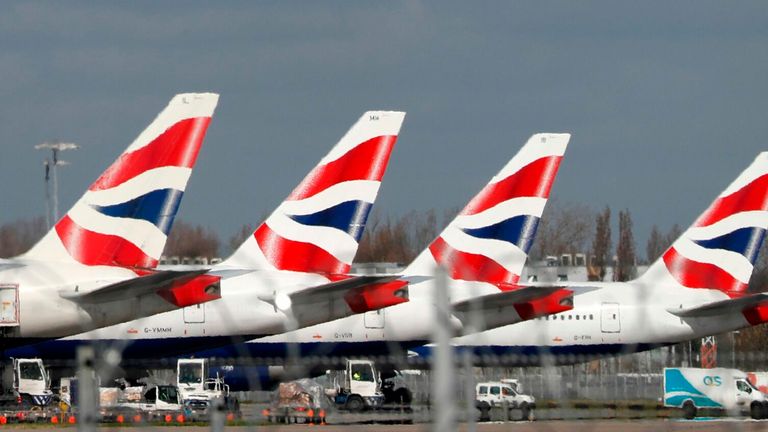COVID-19: Heathrow chief demands ‘vaccine roadmap’ in aviation rescue plea
The boss of Britain’s busiest airport has called on Boris Johnson to set out an urgent “roadmap” for Britain’s coronavirus vaccination programme in order to protect tens of thousands of aviation industry jobs.
In a letter from John Holland-Kaye, Heathrow Airport’s chief executive, seen by Sky News, the prime minister was urged on Wednesday to implement a three-stage plan for a new testing regime for the sector.
The blueprint would involve a new regime for pre-departure coronavirus testing, initially focused on “countries which have implemented travel bans on UK arrivals in order to get planes back in the air for vital cargo supplies”, Mr Holland-Kaye said.
“This should be an extraordinary measure until the travel bans have been relaxed, at which point the risk-based approach to international connections with key trading markets should be resumed, with pre-departure testing in place for ‘high risk’ countries.”
Such a model would involve a PCR test taken less than three days prior to departure, alongside a rapid test at the airport.
The Heathrow boss urged Mr Johnson to approve the use of rapid-testing technology for passengers “to add an extra layer of protection in to the testing model”.
The third stage of his proposal would comprise a “roadmap for vaccine roll-out in the UK during 2021, so all businesses – aviation included – can plan accordingly”.
Mr Holland-Kaye’s letter is the latest in a stream of pleas from Heathrow and the aviation sector for a rapid testing regime that would enable the genesis of a recovery.
Executives throughout the sector have expressed frustration since the COVID-19 pandemic began in March at the pace of the government’s response to its pleas.
A pledge by Grant Shapps, the transport secretary, to undertake lateral flow testing on lorry drivers embroiled in the crisis at Dover has prompted further incredulity at the absence of a similar regime at Britain’s airports.
Rapid and mass testing is also being considered in schools and has been introduced in Liverpool, with support from the Army provided in some cases.
An aviation source said Heathrow had devised a plan that would not require military assistance.
The crisis facing Britain’s biggest airport has deepened since the government’s announcement of the new Tier 4 restrictions last weekend, with an increasingly bleak outlook for the travel industry during the first quarter of 2021.
“Following your announcement on Saturday detailing Tier 4 restrictions for London and the South East due to the emergence of a new COVID-19, international travel out of Heathrow has effectively been stopped as around 60 countries have closed their borders to passengers from the UK,” Mr Holland-Kaye wrote in his letter.
“While limited and slow progress on introducing testing for passengers has been made, the dramatic deterioration of the situation means that the Government must not delay any longer and – like many countries around the world which require pre-departures tests for aviation – the UK needs to quickly and unilaterally introduce this model, to demonstrate to the world it is serious about protecting their borders as much its own.”
“Whilst of course we support steps to contain this new strain, the decision to restrict international travel again will further damage the national economy and jeopardise jobs at a time when the UK is looking to rebuild and increase links with the rest of the world after Brexit.
“This country is a trading, island nation reliant on its doors being open to connect with markets across the world.”
Mr Holland-Kaye said there did not have to be a choice between public health and the economy: “testing can deliver both,” he wrote.
“A previously successful UK industry that was ranked third in the world is reeling with tens of thousands of jobs at stake.”
Heathrow itself has been hit by industrial action as it cuts hundreds of jobs and amends the employment conditions of other workers.
The airport has, like others, seen passenger numbers slump this year to levels not seen for decades, with a full recovery not anticipated for several years.
Source: Read Full Article





